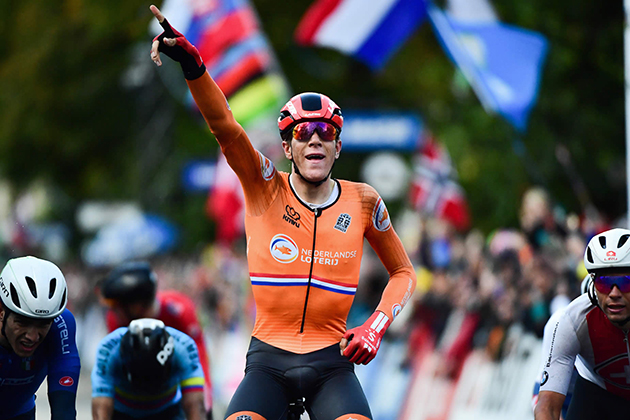

Bicycle Racing News and Opinion,
Tuesday, July 19, 2022
Back to news and opinion index page for links to archived stories | Commentary | Our YouTube page
2021 Tour de France | 2022 Giro d'Italia
In nine lifetimes, you'll never know as much about your cat as your cat knows about you. - Michel de Montaigne

James Witherell's book Bicycle History: A Chronological History of People, Races and Technology is available in both print and Kindle eBook formats. To get your copy just click on the Amazon link on the right.
Current racing:
- July 1 - July 24: Tour de France
Upcoming racing:
- July 2 - 6:
Tour of AustriaCancelled - July 23 - 27: Tour de Wallonie
Latest completed racing:
- Late June: National Championships week
- June 22:
Halle IngooigemCancelled - June 12 - 19: Tour de Suisse
- June 15 - 19: Tour of Belgium
- June 16 - 19: La Route d'Occitanie
- June 5 - 12: Critérium du Dauphiné
The team sent me this update:
Team DSM are thrilled to announce the contract extensions and renewals of several of their Tour de France squad; with Nils Eekhoff, Chris Hamilton, Martijn Tusveld and Kevin Vermaerke all continuing their journey with the team. Hamilton and Vermaerke will ride in the team’s colours until at least the end of 2025, while Eekhoff and Tusveld will pull on the Team DSM jersey through the 2024 season.
Nils Eekhoff (NED):
Having risen through the ranks of Team DSM’s Development program Eekhoff has made progress year-on-year with the team. In his first year in the professional ranks after his promotion to the Men’s program, he took a superb second at Dwars door het Hageland and the Dutch national road race championships; before he played an instrumental role in the team’s win at Bretagne Classic. 2021 saw a strong performance at Boucles de la Mayenne before he made his Tour de France debut.

Nils Eekhoff crossing the line first at the U23 2019 World Championships. He was DQ'd.
Eekhoff said: “I’m really happy to extend my contract with Team DSM; I think we are a perfect fit. The team showed a lot of trust in me during periods of bad luck but also in general too, and I show that trust back in them – we have a really good relationship. After several seasons with the team so far, I’m excited to be continuing here for many more years to come where hopefully we can continue to push each other to get better.”
Team DSM head coach Rudi Kemna added: “After a year of bad luck for him, we’re looking forward to getting back on track with Nils as he continues to develop as a rider on and off the bike. We want to help him progress to being the best that he can be with a focus on the classics; where we see that his skillset lies. Yet, Nils is also a great team player and he’s shown at high level races like the Tour de France he is also strong in the lead out and that’s also where we want to develop too.”
Chris Hamilton (AUS):
A stalwart of Team DSM, Hamilton is currently in his sixth season with the team after turning professional back in 2017. A culture carrier on and off the bike, Hamilton an exemplary professional and more than happy to give his all for his teammates. A strong climber, Hamilton himself has picked up some great results when riding as a finisher, including a breakthrough sixth place on GC at the Tour Down Under in 2019. Last year saw him take his first Grand Tour stage podium places too, with brilliant rides netting a second and third at the Giro d’Italia and Vuelta a España respectively. 2022 has seen Hamilton once again show off his climbing prowess, often up there in the tough finales, riding superbly in support of the team’s goals – something he hopes to continue in the years to come.
Hamilton explained: “I was happy to be given the opportunity to extend my contract with Team DSM. The past five and a half years have been really good for me and I feel well at home in the team environment. I get along really well not only with the riders but the staff as well. For me it’s a happy place to be and I look forward to what we have planned together in the next three years.”
Team DSM head coach Rudi Kemna continued: “Chris has been with the team for a while now and he’s really grown as a person with us. He’s showing himself more and more off the bike in a captain’s style role which is great, and he’s always willing to work hard for the team’s goals. He’s a very loyal and person and is fantastic at his job. On the bike, he also continues to take steps each year and has showcased his talents as a climber; especially this year at the Giro and the Tour where he is often up there providing strong support; or in previous seasons where he’s had the chance to be the finisher.”
Martijn Tusveld (NED):
Joining Team DSM in 2018, Tusveld has spent five good years with the team so far where his all-round capabilities have shown through; both in support of the team’s finishers or when he’s been the rider to go for a result. Strong-willed and determined, Tusveld fought back after a tough crash in Paris-Nice 2019, before going on to help the team claim a top ten finish in the Vuelta that year alongside a solid tenth on GC himself at the Tour of Guangxi. The years since have saw Tusveld’s development continue where he played an important part in the team’s double GC podium finish at the Giro d’Italia in 2020, and that trajectory has continued into this season where he took his first ever Grand Tour top five stage placing with a fifth place at the Giro d’Italia. Building on his continued development, Tusveld is looking forward to continuing his journey with the team.
Tusveld said: “Upon joining the team in 2018 I’ve been made to feel at home and welcome here. I think it’s a really nice environment with a great group of people who I get on with, both on and off the bike. I feel like I’m getting stronger as a rider year-on-year with the team and I want to continue making those steps and progressing. I’m excited to see what the years to come bring.”
Team DSM head coach Rudi Kemna added: “Martijn has really developed himself into a strong all-round rider who has good power for the flat but he can also climb well too. It was great to see him showcase his legs in the breakaway at the Giro with is fifth place. We have a lot of respect for each other and we can discuss things openly. We’re looking forward to seeing what he can continue to do with the team as he continues his strong GC support role and stage hunting.”
Kevin Vermaerke (USA):
Settling in well upon his arrival into the team in 2021, Vermaerke’s first season in the professional ranks saw him ply his trade over a multitude of terrain; sampling a mix of classics and stage races, where he rode in a strong support role. 2022 has seen Vermaerke’s upward trajectory continue as he continues to find his feet in the peloton. The year started off well with an 11th place on GC at the Tour of Oman which included two top-ten stage finishes, before helping the team throughout the classics. Building form well, Vermaerke claimed his best pro result so far with a fighting fourth place from the breakaway at the Dauphiné and carried that into his first ever Grand Tour start at the Tour de France. The opening week saw him ride brilliantly in support of the team’s goals before an unfortunate crash saw him abandon on stage eight. Leaving the race early has only motivated Vermaerke to show himself even more with the team in the future.
Vermaerke expressed: “After starting out my WorldTour career with Team DSM, it’s been a great journey so far, and especially this year I feel as if the team and I have really taken big steps together towards the top of the sport. I feel at home here and I’m very excited to stay with the team through the end of 2025 and put 100 percent focus towards continuing my progression in the sport. The team has put a lot of belief and trust in me as a young rider and I am looking forward to continuing this great relationship.”
Team DSM head coach Rudi Kemna continued: “Still relatively young, Kevin has settled in really well at the team. This year especially he has really shone and grown as a rider and an athlete off the bike too, coming more out of his shell. He’s a committed individual who always gives his all for the team. On the bike his level has continued to increase and he’s been able to show himself in difficult terrain; either on the attack or in support of the team’s goals. It’s a real shame he had to abandon the Tour but we’re confident that he will bounce back and continue to improve his level in the right direction.”
The team sent me this press release:
Team Qhubeka are the sixth team confirmed for this year’s race; they will join a Great British national squad and the country’s four leading domestic squads
Team Qhubeka is thrilled to announce that it will return to the Tour of Britain in 2022. Featuring South African rider Nicholas Dlamini, who was crowned the ŠKODA King of the Mountains in the 2018 Tour, the team will compete in the UK’s most prestigious cycle race for the 10th time.

Nicholas Dlamini at the 2018 Tour Down Under. Sirotti photo
Team Qhubeka have an illustrious history in the event, having won the race twice – through Edvald Boasson Hagen (2015) and British rider Steve Cummings (2016) – since they made their debut in 2008. Boasson Hagen also claimed one of the team’s two stage victories in the race to date.
The team’s roster includes some of Africa’s most promising talents – including South African Travis Stedman and Ethiopian Negasi Haylu Abreha – alongside upcoming Italian riders Luca Coati, Jacopo Menegotto and Kevin Bonaldo. Since the team’s inception, Team Qhubeka has played a crucial role in developing cycling in Africa. Over 50 riders from the continent have had the opportunity to grow through the team’s programme and race at the highest level. Qhubeka, the team’s charity partner, has supplied more than 100,000 bicycles through fundraising initiatives.
Mick Bennett, Tour of Britain race director, said: “Inviting Team Qhubeka back to the Tour of Britain was a no-brainer. In addition to being one of the most successful teams in modern race history, the work Qhubeka do in Africa still needs to be both celebrated and given a platform from which their message can be spread. We wish them the best of luck for their upcoming races and look forward to seeing them in Aberdeen this September.”
Douglas Ryder, Team Qhubeka - team principal, said: “To be invited this year to the UK’s biggest bike race is such a privilege. We have fought hard on the roads of the UK with great success in the past and have always felt the warm reception and support for our team and the Qhubeka Charity from the public. We look forward to showing our colours and presenting our young team this year in an event ending on the Isle of Wight, and its toughest finish to date.”
This year’s Tour of Britain will see over 100 of the world’s best riders battling it out for glory across eight days of racing. Beginning in Aberdeen and Aberdeenshire on Sunday 4 September, this year’s route will feature the race’s first visit to North Yorkshire since 2009, and first-ever full stages in Gloucestershire and Dorset, before what promises to be an unforgettable finale on the Isle of Wight (Sunday 11 September).
Team Qhubeka are the sixth team confirmed for this year’s race; they will join a Great British national squad and the country’s four leading domestic squads – Ribble Weldtite Pro Cycling, Saint Piran, TRINITY Racing and Wiv SunGod – on the start line.
Last year’s star-studded race was won by Belgian rider Wout Van Aert (Team Jumbo – Visma), with reigning world road race champion Julian Alaphilippe finishing third overall. A roadside crowd of over one million spectators resulted in the Tour of Britain generating £29.96m of net economic benefit for the UK economy, according to research by Frontline.
ITV4 will continue to broadcast live flag-to-flag coverage of every stage, as well as a nightly highlights show, allowing fans in the UK to watch wherever they are. The race will also be shown in over 150 countries worldwide, in part thanks to the event’s partnerships with Eurosport and the Global Cycling Network.
Fuglsang’s Team Israel-Premier Tech posted this bad news:
Unfortunately, Jakob Fuglsang won’t take the start on tomorrow’s stage 16.
Israel-Premier Tech’s Danish climber crashed with 60 km to go on stage 15 and although Fuglsang managed to finish the stage, an X-ray examination afterwards revealed a fractured right rib.

Jakob Fuglsang before the start of stage 2. Sirotti photo
Fuglsang and the Israel – Premier Tech medical team have therefore decided that the best course of action right now will be for Fuglsang to go home in order to start his recovery as soon as possible.
Fuglsang: “Of course, I am disappointed. I’ve tried to race with a fractured rib before and fight through it and make it all the way until the end. But, in this case, I know I have nothing to win by trying to hang on so it’s better to pull the plug, go home and recover. I know that it’s too painful to continue so it’s my only option. I hope the team can keep up the good work. There are some hard stages to come but they will keep fighting until the end and hopefully get another stage win.”
The team posted this guide:
How our riders eat and drink during the hardest stages of the Tour
The mountain stages of a Grand Tour are daunting, to say the least.
Navigating hairpins, the altitude, and unpredictable weather conditions, on top of the usual stress that comes along with 21 days of racing, all make for dramatic TV but are also taxing to the riders. The intense effort a rider sustains can be a jaw-dropping 350-375 watts over an hour. This is something a strong amateur cyclist can sustain for only a few minutes.

EF Education-Easypost rider Neilson Powless racing in stage five. Sirotti photo
Mountain stages are typically around five hours long and riders can burn 4,000-5,000 calories on the stage alone. All told, the energy expenditure of a rider may exceed 7,000 calories in one day, nearly three times that of an average person.
So how do riders fuel for a mountain stage?
Dinner the night before the race
An evening meal should contain 5-8 grams of carbohydrate per kilogram of body weight. This helps preserve and restore as much muscle glycogen as possible. Muscle glycogen is the most important fuel source for intense efforts such as long mountain climbs. High carbohydrate sources such as pasta, rice and potatoes are good choices.
Breakfast the morning of the race
A good breakfast on race day is essential. Breakfast has a different purpose than dinner. Although some of the breakfast carbohydrates can still be stored in the muscle, the most important function served with breakfast is the filling of liver glycogen stores. The role of the liver is to supply glucose into the bloodstream. During exercise, as glucose is removed from the blood to be used as fuel in the muscle, the liver needs to work harder to supply glucose so that blood sugar doesn’t drop. If a cyclist is unable to produce enough glucose, the consequences can be grave. If glucose concentration drops too low, the brain will not get enough glucose. Weakness and dizziness will set in and an athlete may become cold and start to shiver even on a hot day. Stick to higher carbohydrate sources such as bagels, toast and oatmeal. Generally, eat 3-4 hours before your event.
Fuelling during the stage
The next way to maintain blood glucose and provide additional fuel is through the intake of food and drinks during the stage. If a rider waits until feeling hungry to eat, it’s already too late, so it’s important to begin fueling early in the race and consistently throughout. Many riders will target as much as 90 grams of carbohydrates per hour. Early in the stage, a lot of those carbs will come from energy bars, rice cakes, baked goods (the perfect excuse for that Nutella-stuffed croissant), and carbohydrate drinks. Later in the day, riders move to even more rapid carbohydrate sources that are very gentle on the stomach. The carbohydrates have a specific composition of maltodextrin and fructose that optimizes the delivery of fuel to the muscle. Gels and carbohydrate-based drink mixes are better in the later stages of a race. Gels and drink mixes are both carbohydrate sources which serve a similar purpose. The absorption of gels versus sports drinks is very similar provided the composition is ideal. 2:1 maltodextrin-to-fructose is an ideal blend for rapid absorption.
Let’s not forget fluids!
Of course, it is not just about eating. Fluids are important as well, especially on hot days. The dry air at altitude will stimulate sweat evaporation, making it harder for the body to cool itself. Pros will grab chilled bottles of Neversecond C30 carb mix from their soigneurs on the road. On hotter stages, they may drink 8-10 bottles and still lose weight. Sweat rate is very individual and dependent on weather conditions. Riders can expend up to two liters per hour depending on conditions.
Preserving Energy
Riders will try to manage their energy sources as well as they possibly can during the stage. Riding with a group, whether it’s the breakaway or the peloton, allows for drafting which saves watts.
After the stage
When one mountain stage ends, preparation for the next day’s stage begins. Riders need to consume carbohydrate and protein to repair their muscles. With dinner, the entire process repeats itself.
Back to news and opinion index page for links to archived stories | Commentary







